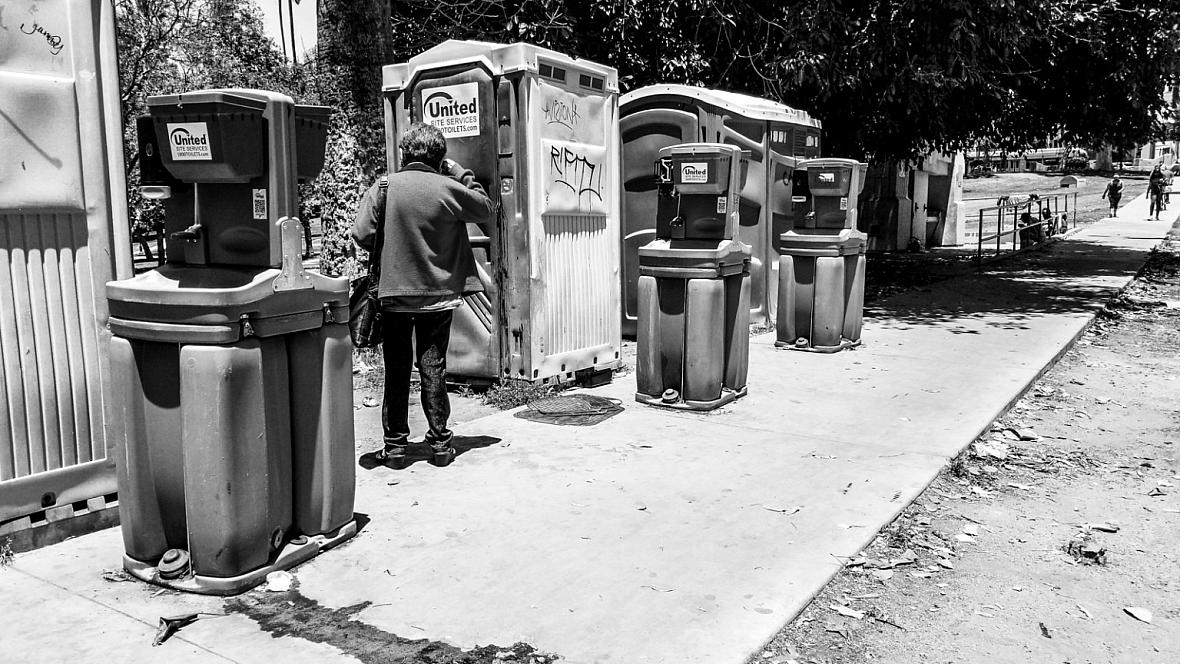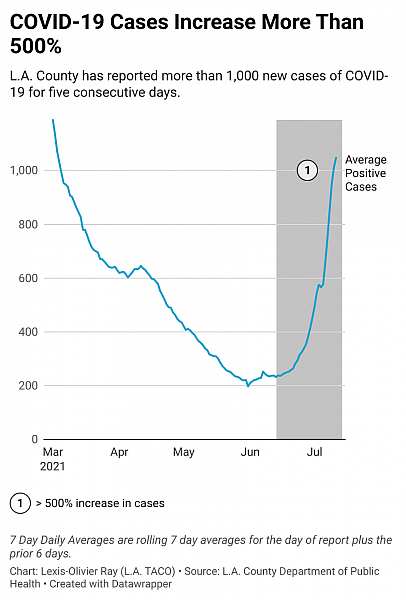LA is deciding to remove all hand-washing stations at encampments as COVID-19 cases surge again
This is the fourth investigative article that was produced by Lexis-Olivier Ray as a project for the USC Annenberg Center for Health Journalism’s 2020 Data Fellowship.
His other stories include:
Part 2: There Weren't Enough Porta-Potties For The Homeless To Begin With, In October They're Being Pulled
Part 5: City Reverses Decision to Remove Washing Stations from Encampments Following L.A. Taco Investigation

We monitored three hand-washing stations over the course of multiple days that were also missing soap. (June 2021)
LEXIS-OLIVIER RAY
A city program that brought hundreds of hand-washing stations and portable toilets to the doorstep of dozens of encampments during the height of the pandemic comes to an abrupt end. L.A. TACO has confirmed that all units city-wide are currently being pulled.
This comes after an L.A. TACO investigation last month revealed that the city failed to assess hand-washing stations daily during the first five months of the pandemic and vendors regularly failed to service units. Over the past 14 months, the city has spent millions of dollars on hand-washing stations and porta-potties. In May, Brian Swanson with the Department of General Services (the city department that manages contracts), told us that the contract for the units expires at the end of October 2021. Purchase orders under that contract have ceased.

The city has decided to end their unprecedented effort to provide basic services to encampments as the number of COVID-19 cases — largely fueled by the easily spreadable Delta variant — reported by the L.A. County health department have increased more than 500 percent in the last month and the percentage of coronavirus tests coming back positive has increased nearly 700 percent.
The county has reported more than 1,000 new coronavirus cases over the past five consecutive days, numbers Los Angeles hasn’t sustained for more than a day since early March. Last week, L.A. Mayor Eric Garcetti announced that he will leave his post as mayor early to accept a job as U.S Ambassador to India (pending confirmation from the U.S. Senate), abandoning Angelenos as they grapple with the ripple effects of the pandemic.
The hygiene units were a temporary solution in response to the pandemic, but the city council could have decided to extend the program or continue purchase orders under the contract through October 31, but they decided to go in a different direction. That direction includes possibly expanding funding for the city’s mobile pit-stop program, a more successful initiative that currently involves hiring staff to clean and monitor portable sinks and toilets as well as vendors to collect the stations from sidewalks each day.
L.A. TACO reached out to Councilmembers Nithya Raman, Mike Bonin, and Kevin de Leon’s offices via email this morning as well as Councilmember Mark Ridley-Thomas’ office this afternoon but as of publishing have not received any statements. Yesterday, in an email to an unhoused advocate with Street Watch LA, Liz Oh (homeless deputy for Councilmember Raman) confirmed that the stations were being pulled city-wide and said that the Mayor’s office was exploring “new options.”
On Tuesday, Harrison Wollman, spokesperson for Mayor Garcetti told L.A. TACO in a statement: “These stations were always intended to be a part of our initial pandemic response. Our office is working with the CAO and partners on the City Council to explore additional funding for our Mobile Pit Stop Program, a more effective method of providing mobile hygiene services, showers, and restrooms to Angelenos experiencing homelessness.”
The next day, Councilmember Bonin said in a Tweet: “We need better street hygiene. The city shouldn’t remove any existing, functional sinks or toilets until we’ve approved & funded a better program. We need more restrooms, open 24/7, with staffing to make sure they remain clean.”
In a statement sent to L.A. TACO on Thursday, Stella Stahl, a spokesperson for Councilmember Raman said their office became aware that hygiene stations were scheduled to be removed at the end of June. “We are currently working to restore hygiene services in our district,” Stahl said. On the same day, the L.A. County Department of Public Health announced that everyone would be required to wear a mask indoors regardless of vaccination status due to the recent surge in cases.
I know unhoused people, including several who are disabled who have come to rely on these stations. They haven't been able to access housing or shelter though they are trying. People have been requesting more of these, and now we are taking away the few that exist. https://t.co/Bw7qNBXPS0
— Sherin Varghese (@SherinV1984) July 14, 2021
During our investigation we spoke to more than two dozen unhoused residents, the majority of whom said that hygiene stations were not properly maintained, they didn’t trust the units or they didn’t know where they were. But we also spoke to numerous unhoused residents that expressed that they knew of hand-washing stations that were well serviced and beneficial. In July we began to notice that some of those units had been removed.
On social media, housing advocates have started to condemn the city’s decision to remove the stations. “People haven’t stopped needing to relieve themselves or wash their hands,” Alex Mullenix, an organizer with the advocacy group K-Town For All, said on Twitter Tuesday afternoon.
Story developing.
This is the fourth investigative article that was produced as a project for the USC Annenberg Center for Health Journalism’s 2020 Data Fellowship. Read the beginning of the series here.
[This article was originally published by L.A. TACO.]
Did you like this story? Your support means a lot! Your tax-deductible donation will advance our mission of supporting journalism as a catalyst for change.

